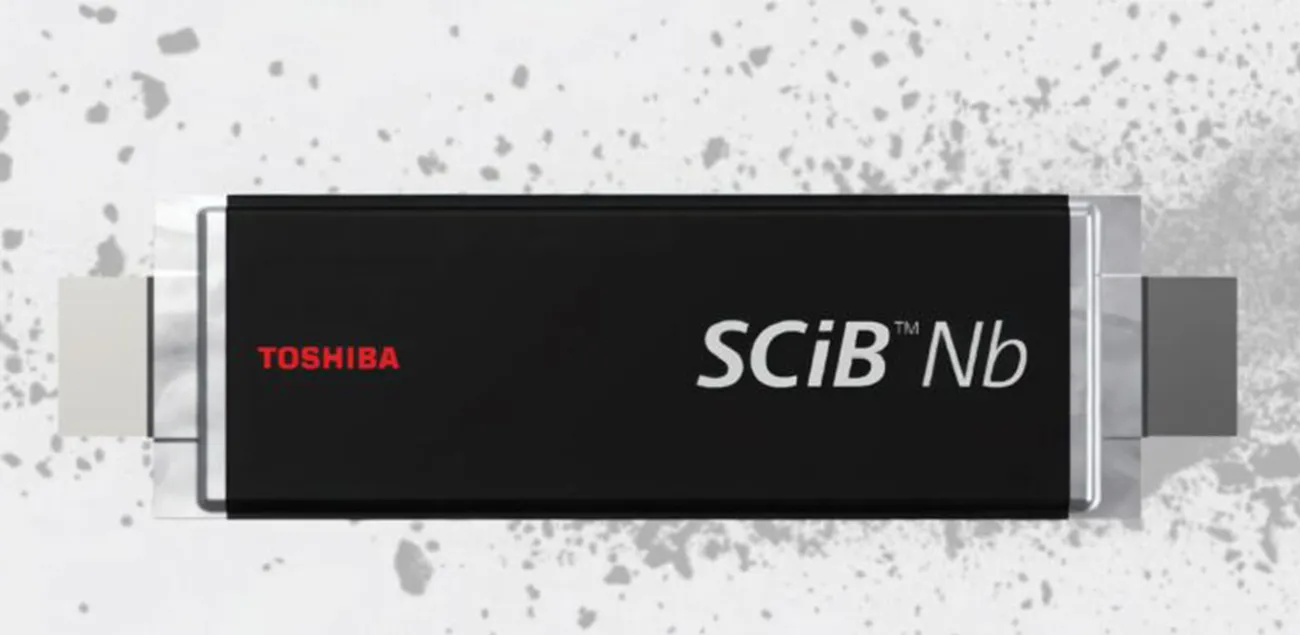
Toshiba, a Japanese electronics and industrial conglomerate, has begun delivering samples of its new rechargeable lithium-ion battery, the ‘SCiB Nb’, to manufacturers. Developed in partnership with Brazilian niobium producer CBMM and Japanese trading company Sojitz Corporation, the battery utilizes a niobium-titanium oxide (NTO) anode to deliver an estimated service life of 15,000 cycles and an 80% charge in just ten minutes. The technology is being positioned as a durable, fast-charging alternative to conventional lithium-ion cells for the commercial vehicle market.
The battery’s developers claim the NTO anode provides a volumetric energy density of 350 watt-hours per liter (Wh/L), which is comparable to widely used lithium iron phosphate (LFP) batteries. However, the key differentiator lies in its ability to withstand repeated, rapid charging cycles without significant degradation, a critical requirement for commercial electric vehicle fleets.
Advanced Anode Technology Enables Rapid Charging and Extended Lifespan
The core innovation of the SCiB Nb battery is its anode material, which replaces the graphite found in most lithium-ion batteries with niobium-titanium oxide. According to Toshiba, this material composition addresses a key failure point in other battery chemistries, especially LFP. Repeated rapid charging of graphite-based anodes can lead to the formation of metallic lithium deposits, a phenomenon known as lithium plating. This increases the risk of internal short circuits and accelerates battery degradation over time.
Toshiba states that the NTO anode structure prevents these metallic lithium deposits, ensuring greater safety and durability even when subjected to frequent high-power charging. This characteristic is what allows for the battery’s projected 15,000-cycle lifespan, a substantial improvement over many existing battery technologies and a key factor in lowering the total cost of ownership for commercial operators.
Technical Specifications and Performance
The initial samples being delivered are 50 Amp-hour (Ah) cells with a nominal voltage of 2.3 volts and an output power of 1 kilowatt (kW). The key specifications include:
- Volumetric Energy Density: 350 Wh/L
- Gravimetric Energy Density: 130 Wh/kg
- Charging Rate: 5C, enabling a 10-minute charge to 80% state of charge
- Operating Temperature: -30°C to +60°C
- Cell Dimensions: 98 mm x 280 mm x 12 mm
- Cell Weight: 860 grams
This performance profile, particularly the wide operating temperature range and rapid charging capability, is designed to meet the rigorous demands of commercial applications.
Strategic Partnership Drives Commercial Vehicle Application
The development and go-to-market strategy for the SCiB Nb is supported by a close partnership between Toshiba, CBMM, and Sojitz Corporation. This collaboration leverages the strengths of each company: CBMM provides the raw niobium, Sojitz manages the niobium titanate supply chain for the Japanese market, and Toshiba contributes its battery design and manufacturing expertise.
The partnership is initially targeting commercial vehicles, such as electric buses and trucks. For these applications, high vehicle availability and dense operating cycles are paramount. The ability to perform frequent, rapid “opportunity charging” at designated points along a route allows fleet operators to reduce the number of batteries installed per vehicle, thereby lowering upfront capital costs. The extended service life is also expected to reduce the need for costly battery replacements due to degradation.
An initial trial has already been conducted, with Toshiba testing the new battery in an electric bus prototype at CBMM’s industrial plant in Araxá, Brazil, demonstrating its real-world potential.
Company Background and Market Context
Toshiba is a Japanese multinational conglomerate with a diverse portfolio spanning electronics, energy systems, and industrial infrastructure. In the battery sector, the company has a history of innovation, having previously commercialized its ‘SCiB’ line of cells featuring a lithium titanate anode, also known for safety and long life. The new NTO-based ‘SCiB Nb’ represents the next evolution of this technology.
CBMM is a Brazilian company and the world’s leading producer of niobium products. Headquartered in Araxá, Minas Gerais, the company’s mining and processing operations supply the vast majority of the global market for this critical metal. CBMM’s involvement is crucial for securing the primary material for the new NTO anode.
Sojitz Corporation is one of Japan’s largest general trading companies, with a global network spanning various industries, including metals, energy, chemicals, and automotive. As CBMM’s sole representative for the Japanese market, Sojitz has been instrumental in cultivating applications for niobium and building the stable supply chain necessary to bring the SCiB Nb battery to market.
Niobium in Battery Technology
Niobium is a metal primarily used as an alloying agent in steel to increase its strength and durability. However, its unique properties are making it increasingly valuable in advanced technology applications. In battery anodes, niobium oxides offer a stable crystal structure that can facilitate the rapid movement of lithium ions without sustaining the physical stress that leads to degradation in other materials. As Brazil is the dominant global supplier of niobium, strategic partnerships like the one between Toshiba, CBMM, and Sojitz are essential for developing and scaling up new niobium-based technologies for the energy transition.



